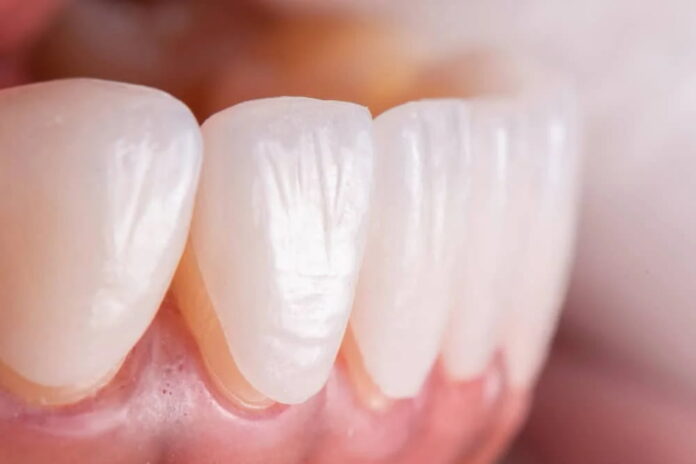Veneers are increasingly favoured for cosmetic dental improvements in the UK, presenting an opportunity for many to acquire an ideal smile. It is vital to consider such a choice from an informed standpoint, given the transformative results and the uplift in self-esteem it offers. Before embarking on this dental journey, one must grasp the potential hazards that accompany the process.
In this guide, we will discuss the potential risks of veneers, making sure those considering this dental route comprehend the advantages and the possible drawbacks.
What are Veneers?
Veneers are slender facades, typically fashioned from porcelain or composite resin, that mask the teeth’s anterior surface. They provide an aesthetic boost by delivering an even, whiter dental visage.
Individuals seek veneers for various purposes. Some are trying to get rid of stains resistant to standard whitening methods. Others aim to amend slight misalignments or interdental spaces without orthodontics. Moreover, veneers can mend chips or wear, revitalising the tooth’s appearance.
The application process involves the dentist removing a minuscule portion of the tooth enamel to accommodate the veneer, culminating in a natural fit. Although veneers can resolve a multitude of cosmetic dental issues, a comprehensive understanding of the process and its lasting consequences is essential.
Common Risks Associated with Veneers
A prevalent concern with veneers is the onset of heightened tooth sensitivity due to enamel removal during the procedure. Without this protective barrier, teeth may become more reactive to temperature variations, causing discomfort when consuming hot or cold items.
The irreversibility of enamel excision for veneer fitting is another serious consideration. Once removed, the enamel cannot grow back, meaning that veneers and other similar dental procedures should be considered a permanent decision.
Additionally, aesthetic discrepancies might arise if the veneers do not perfectly match the colour of the natural teeth. Although dentists aim for a match, mismatches can lead to dissatisfaction.
Furthermore, veneers that are not precisely fitted might lead to gaps that allow bacteria to thrive, potentially causing decay. This highlights the need for meticulous oral hygiene and regular dental visits post-veneer placement.
Serious Potential Risks of Veneers
Though they are generally safe when applied by a professional, veneers pose some severe, albeit infrequent, risks that are worth noting.
– A significant hazard is the excessive removal of tooth structure before veneer placement, potentially necessitating root canal treatment or leading to tooth loss.
– The gums may also react adversely to veneers, possibly resulting in inflammation, tenderness or occasional bleeding, which could compromise gum health and the cosmetic interface of the veneer and gum line.
– Veneers, while sturdy, are not impervious to damage. Excessive force or trauma may cause them to fracture or chip.
– As natural teeth shift with age, veneers may become misaligned, impacting the visual appearance and bite.
– The rare occurrence of a veneer debonding can be influenced by various factors, such as the quality of the bonding agent or the amount of enamel that is affected. Reattachment or replacement would then be necessary.
Awareness of these risks underlines the importance of selecting a reputable dental practitioner and ongoing dental appointments to make sure the veneers stay in good condition.
The Importance of Legal Advice If Veneers Go Wrong
Should veneer procedures result in suspected negligence, consulting a solicitor, particularly one versed in dental negligence, is important.
They can clarify your rights and advise on the validity of your claim, as well as helping you collate vital evidence and manage complex legalities. They will negotiate on your behalf to secure compensation for a negligent veneer procedure.
Additionally, solicitors offer support, directing clients to support networks or counselling services, mitigating the emotional impact of dental procedures gone awry.
In instances of presumed negligence, the solicitor becomes a vital advocate, ensuring legal redress and patient advocacy.
Tips for Minimising Risks
Proactive steps can lessen the risks associated with veneers, helping you achieve a favourable experience and outcome. Consider these guidelines for a secure process:
– Research your dentist: ensure the dentist’s credibility, especially in cosmetic dentistry and veneers. Reviews, referrals and credentials can be very helpful in this regard.
– Insist on thorough consultations: engage deeply during consultations to understand the risks and establish expectations. A competent dentist will address your queries and explain any concerns you may have.
– Adhere to post-procedure care: follow your dentist’s post-veneer care advice diligently.
– Keep up with dental appointments: continuous dental checks post-healing are crucial for veneer maintenance and early issue detection.
– Keep up on your oral hygiene: consistent brushing, flossing and mouth washing are pivotal for veneer longevity and decay prevention.
– Be conscious of your diet and other habits: avoid hard foods and discuss solutions for teeth grinding, like a night guard, with your dentist.
These measures, along with an open dialogue with your dentist, will enhance the positive aspects of veneers and make sure you are able to avoid the most common risks.
Read Also
- How Elderly Live-In Care Supports IndependenceWhat does it mean to stay independent as we age? Many older adults want to remain in their homes, where they feel safe and comfortable. Live-in care offers a way to make this possible. With a caregiver’s help, daily needs can be met without losing freedom. It allows seniors to keep routines while getting the… Read more: How Elderly Live-In Care Supports Independence
- Modern Approaches to Brain Tumor Treatment and CareBrain tumors are serious and complex, but today’s treatments offer more hope than ever. Thanks to new technology and medical advances, doctors can treat brain tumors more safely and effectively. Patients also receive better care that focuses on their whole well-being, not just the disease. Read on and learn more! New Ways to Treat Brain… Read more: Modern Approaches to Brain Tumor Treatment and Care
- Custom Medication Solutions: Enhancing Personalized Patient CareDid you know that the global personalized medicine market is expected to hit around $1315.43 billion by 2034? This shows the rising demand for treatments tailored to patient needs. Personalized healthcare is now more important than ever. Each patient has unique genetics, lifestyles, and health challenges. Knowing these differences helps deliver care that works. Custom… Read more: Custom Medication Solutions: Enhancing Personalized Patient Care
- Facials for Sensitive or Rosacea-Prone SkinDelivering effective facials for sensitive or rosacea-prone skin requires a comprehensive approach. From initial consultation to post-treatment care, understanding client needs is crucial. Tailored facials not only address skin concerns but also enhance overall well-being. When considering the best practices for facials, you must focus on creating a seamless and customized experience for individuals with… Read more: Facials for Sensitive or Rosacea-Prone Skin
- How Does Therapy Help in the Treatment of DepressionTherapy plays a crucial role in the treatment of depression by providing structured support and personalized strategies to manage and overcome depressive symptoms. In Florida, healthcare providers are at the forefront of offering specialized depression therapy programs that cater to individual needs, enhancing the effectiveness of treatment. Understanding depression therapy involves recognizing how therapy helps… Read more: How Does Therapy Help in the Treatment of Depression
- The Role of Technology in Revolutionizing Senior Memory CareWhat if your loved one could feel safe, happy, and truly cared for every single day? Revolutionizing senior memory care means creating spaces where seniors can thrive, not just live. It’s about personalized support, warm connections, and activities that bring joy and purpose back into daily life. Every detail is designed to honor their memories… Read more: The Role of Technology in Revolutionizing Senior Memory Care







